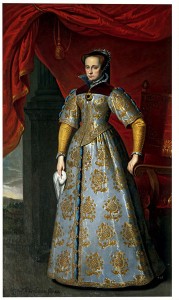
On this day in history, 1st October 1553, Mary I, daughter of Henry VIII and Catherine of Aragon, was crowned queen at Westminster Abbey by Stephen Gardiner, Bishop of Winchester.
Here are links to some articles I wrote for the Tudor Society on the lead-up to Mary’s coronation in 1553:
- Mary I’s Coronation Part 1 – Mary travels to the Tower
- Mary I’s Coronation Part 2 – Knights of the Bath
- Mary I’s Coronation Part 3 – The Coronation Procession of Mary I
- Mary I’s Coronation Part 4 – The Coronation
Mary had been proclaimed queen on 19th July 1553 thirteen days after the death of her half-brother, Edward VI, and in place of Lady Jane Grey who had been proclaimed queen on 10th July 1553.